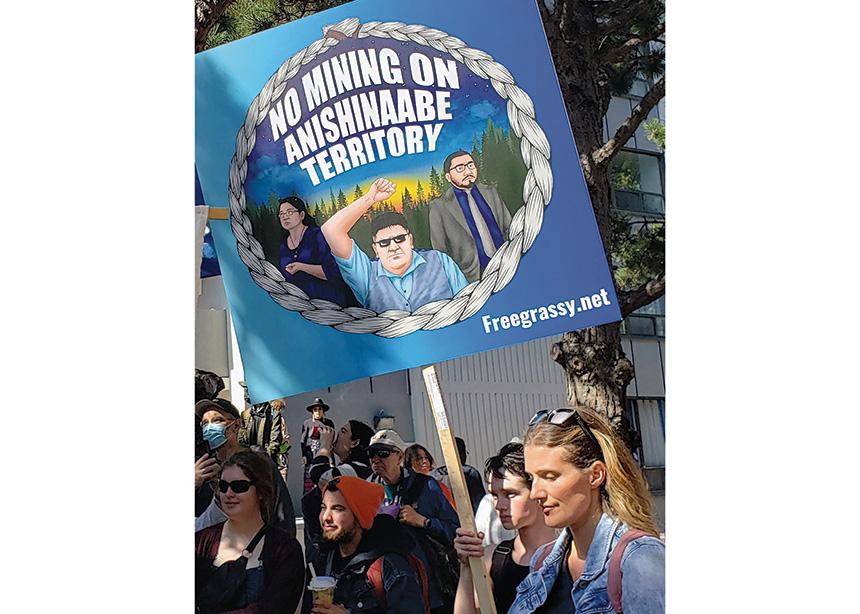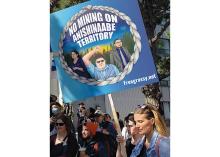Through the weight of ongoing struggles over logging, mercury poisoning and, most recently, mining, the people of Grassy Narrows First Nation in northwestern Ontario continue to defend their interests and make their voices heard.
Community Peacemaker Teams (CPT) has maintained connections with the community, also called Asubpeeschoseewagong Anishinabek, since 2002. CPT members visited Grassy Narrows in May and August, and they were among as many as 6,000 people from Grassy Narrows, four other First Nations and supporters who gathered for a rally in Toronto on September 27.
The five First Nations are concerned about encroachment of outside mining companies in their traditional territories. Leaders from Grassy Narrows say there may be up to 5,000 mining claims on their lands. They currently have no say in the process. The group demanded a meeting with Premier Doug Ford. Ford refused.
Chief Rudy Turtle of Grassy Narrows told CTV News that while he would rather sit down at the table, his people will blockade if necessary. That would not be new for them. In 2002, Grassy Narrows started blocking logging trucks in their territory. The blockade has essentially remained in effect ever since.
That was also the year CPT was invited to join the Grassy Narrows blockade, located roughly an hour northeast of Kenora, not far from the Manitoba border. That blockade, which stopped logging in part of the First Nation’s traditional and use area, remains in effect today.
Amy Peters from Hanley, Saskatchewan, was among the CPT personnel who accepted the invitation and travelled to Grassy Narrows in 2002. She was also among the CPT delegation that returned to the territory this past May.
“We’re all aging, and can you believe that 20 years later, there’s still a lot of the same struggles,” said Peters. She was happy for the opportunity to connect with Grassy Narrows leader Judy Da Silva on her May visit.
Peters said she sees a desire for social change in the world, and that this change is dependent on the actions of people who think beyond their own basic survival.
Esther Townshend, who serves as a volunteer with CPT, joined the August 2023 delegation to Kenora, Winnipeg and Grassy Narrows. This delegation was open to members of the public.
“One thing that I’ve really admired about leaders from Grassy Narrows is the way in which they’ve . . . cultivated relationships with a very broad support coalition,” she said.
Townshend has been a member of the Toronto Grassy Narrows Solidarity Group since 2019. The group takes direction from Da Silva and the Grassy Narrows Women’s Drum Group.
Within the solidarity group, Townshend has served as the main liaison to get other CPT personnel involved in solidarity campaigns and events.
During their visit to Grassy Narrows, Townshend and other participants heard from Lauri-Ann Marshall, the director of the Mercury Care Home that is being planned for the community. In addition to logging and mining, the people of Grassy Narrows have had to deal with mercury poisoning their water.
Between 1962 and 1970, the pulp-and-paper industry in Dryden dumped untreated mercury waste into the English-Wabigoon river system, effectively poisoning the local ecosystem and the people of Grassy Narrows for generations. Some reports indicate dumping of mercury began as far back as 1913.
Among its many lasting health effects, mercury poisoning is known to have severe neurological impacts that have been linked to depression, anxiety and, in some cases, suicide. After many years of pressure, the federal government agreed to build a care home for people suffering the effects of mercury poisoning in Grassy Narrows.
Townshend was impressed with the blueprints for the new facility that Marshall showed the group. “That was a really beautiful thing, just to hear about all of the very meticulous planning that’s gone into designing a care home that will really feel like a home for the people who live there,” she said.
In an email to Canadian Mennonite, Marshall said, “The Grassy Narrows Mercury Care Home, currently in the implementation phase, will provide specialized care and services for community members poisoned by mercury. The specialized services and care will be delivered across the life span, and include resident, palliative, respite and ambulatory care.”
In 2020, the First Nation and the federal government agreed to a funding agreement for $19.5 million for the construction of the facility. The next year they signed a $68.9-million agreement for operation and maintenance costs.
This past June, Chief Rudy Turtle expressed frustration with delays in construction and said construction costs had increased significantly.
A representative of Grassy Narrows told Canadian Mennonite that community leaders were not available for interviews, as they were mourning the death of a young community member.
That young person was Nora Swain. Swain was an activist and budding journalist who twice attended the annual Grassy Narrows march at the Ontario legislature. In a blog post for the Amnesty International Write for Rights Campaign, she described the effects of mercury poisoning on her mind and body, stating that she suffered from migraines, anxiety and depression.
She discussed her fears about one day having children, since mercury is passed on from pregnant mother to child. “I know what it feels like to be from a small place and how it feels like to have a problem that seems like it’s never going to be fixed,” she wrote. “I know what it’s like to feel that darkness.”
Despite ongoing darkness and challenges, the people of Grassy Narrows continue to stand firm, as they also deal with loss and grief. CPT, for its part, remains committed in solidarity, looking forward to planning more delegations in the future.




Add new comment
Canadian Mennonite invites comments and encourages constructive discussion about our content. Actual full names (first and last) are required. Comments are moderated and may be edited. They will not appear online until approved and will be posted during business hours. Some comments may be reproduced in print.